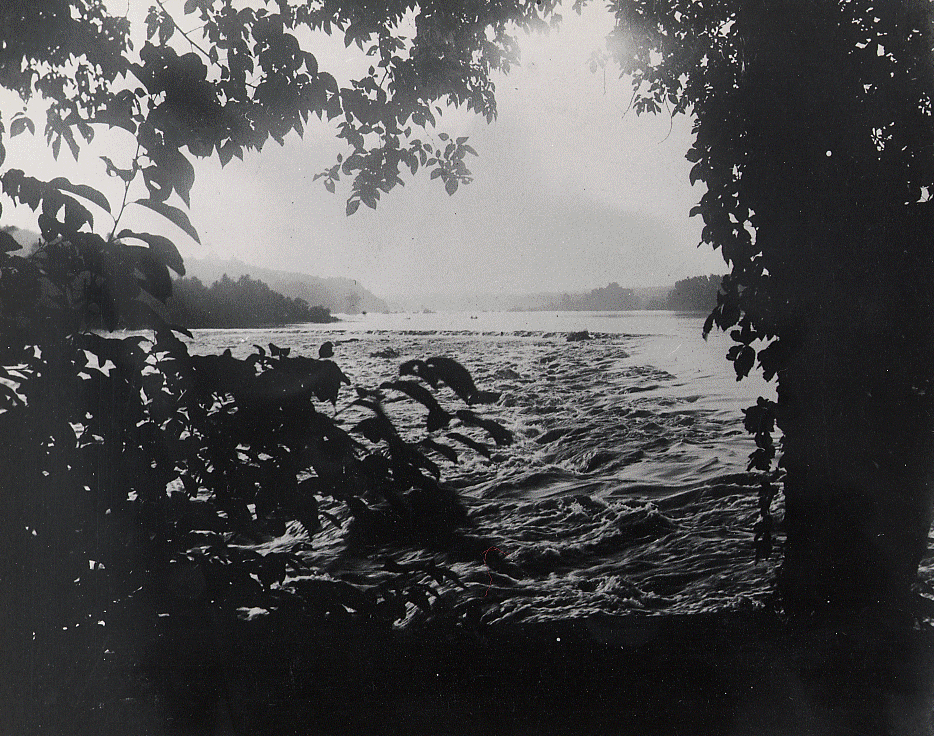
The Potomac River from an island
The Town of Glen Echo, Maryland
The town of Glen Echo, Maryland was chartered in 1904, but its development predates the charter by more than a decade. In late 1887, Edward Baltzley began buying up land in Montgomery County on the bluffs and hills overlooking the Potomac River Valley. By late 1888 he had acquired over 500 acres from the Cabin John Creek and extending past Naylor's Branch (near present day Walhonding Road). The acreage included Fairway Hills, Mohician Hills, Glen Echo Heights, all of what is now the town of Glen Echo, and much of what is now Bannockburn.
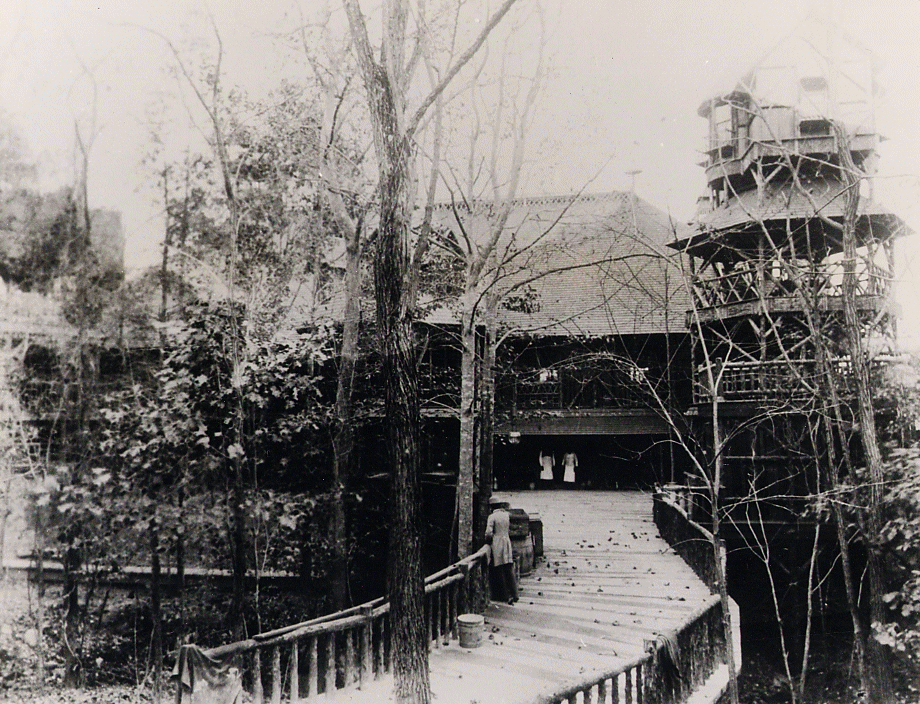
The Glen Echo Cafe, made of 30,000 cedar logs
The Town of Glen Echo, Maryland
Edward and his twin brother Edwin were intent on developing a luxurious, sub-urban, community of platial homes on the Potomac palisades. They opened a fantastic cedar log restaruant in July 1890 to bring visitors to the property, convinced that visitors simply seeing the land would sell it. The Pa-tow-o-meck cafe was an initial success, but caught fire and burned to the ground in 2-hours, less that 6 months after it opened.
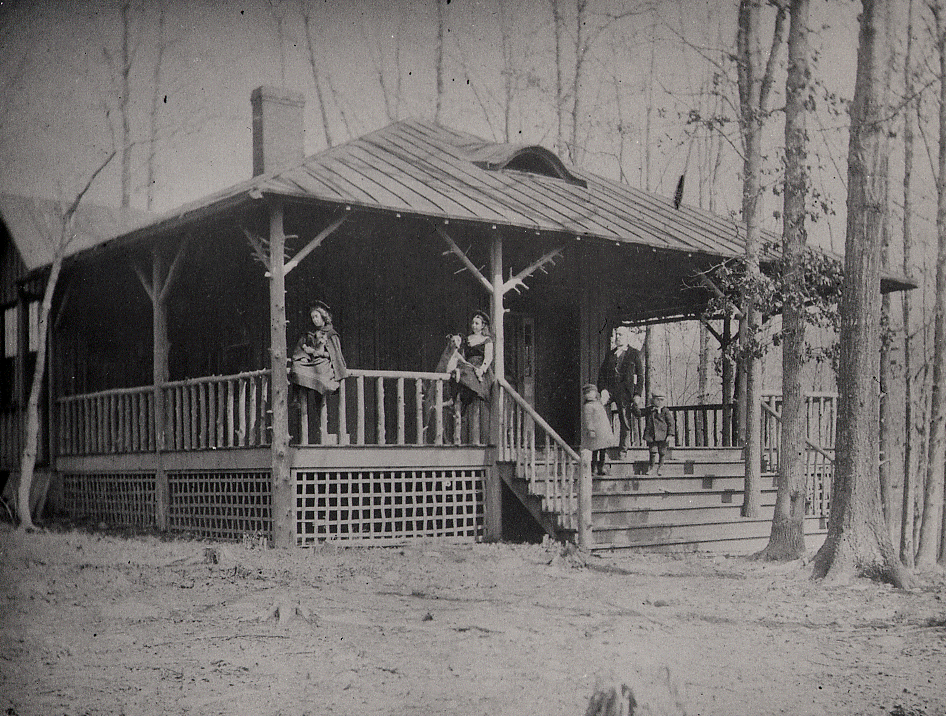
A cottage at Glen Echo in the 1890's
The Town of Glen Echo, Maryland
Even during the bustle of opening a cafe, the brothers were planning for more attractions. Edwin's wife, Edith, was a member of the Washington DC banch of the Chautauqua Literary & Scientific Circle. Edith suggested that a summer
Chautauqua at Glen Echo might bring even more visitors (and thereby sell more lots). The brothers agreed and began plans for a grand, and permanent, Chautauqua at Glen Echo. The Chautauqua was a great success for one season, but never reopened due to complex economic circumstances.
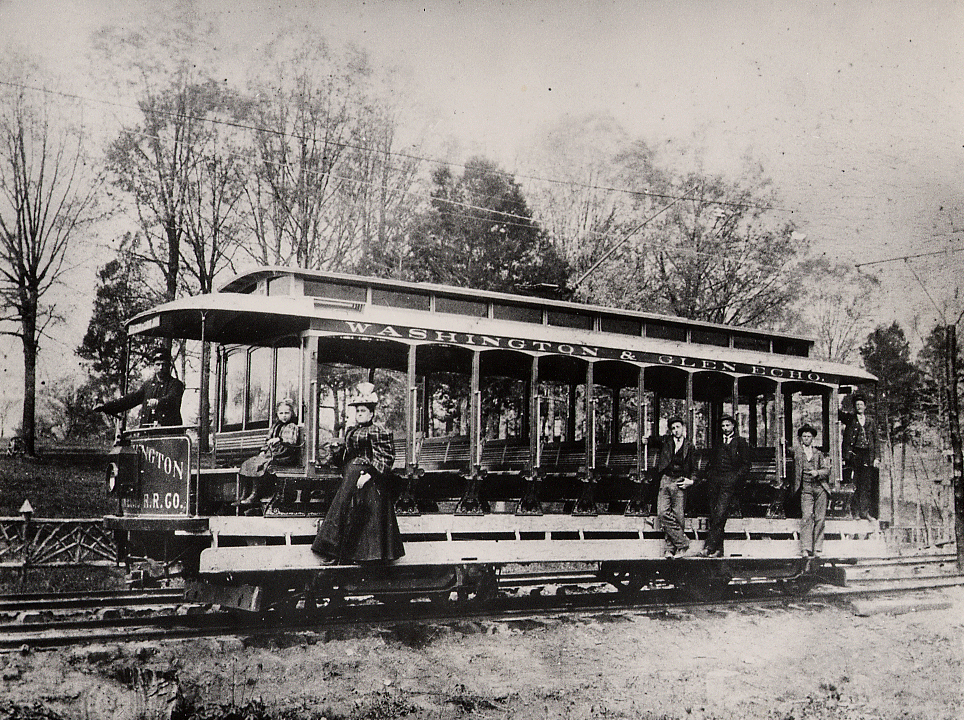
Trolley coming from Glen Echo along Conduit Road
The Town of Glen Echo, Maryland
Part of the Chautauqua plans included an assortment of small lots adjacent to the Chautauqua campus. The lots were primarily intended as camp sites for use during the Chautauqua season (June through August) and were under the jurisdiction of the Chautauqua organization. The lots were appropriately sized for cunstruction of a tent platform, to keep out of the summer mud, and perhaps an outhouse (though early plans were underway for a complete sewage system). Many lots sold that first season, with some people buying multiple adjacent lots with plans to build summer cottages. After the Chautauqua failed, lot sales ground to a halt, those lots that did sell sold at bargain prices. The Baltzleys completed the sewage system, hopeful of renewed interest in land sales.
Over the following years, from 1892 until 1903, a number of families built cottages and moved in year-round, creating a growing community. Many of the residents worked at the fledgeling amusement park which was growing among the buildings of the Chautauqua campus. The Chautauqua had a Post Office for the 1891 season, but there are no records of one for the period from 1892 until 1897, when a Post Office was opened in one of the old Chautauqua buildings. Transportation was an impediment to growth, so the Baltzleys along with other Washington business men chartered the West Washington & Great Falls Electric Railroad Company and built a trolley line to Glen Echo along the Potomac River from Georgetown in DC. Taking advantage of the trolley line, Clara Barton, the founder of the Amerian Cross, moved to Glen Echo in 1897 where she lived until her death in 1912. Barton enthuastically endorsed Glen Echo as a healthy place to live, trying to dispel false rumors of rampant malaria.
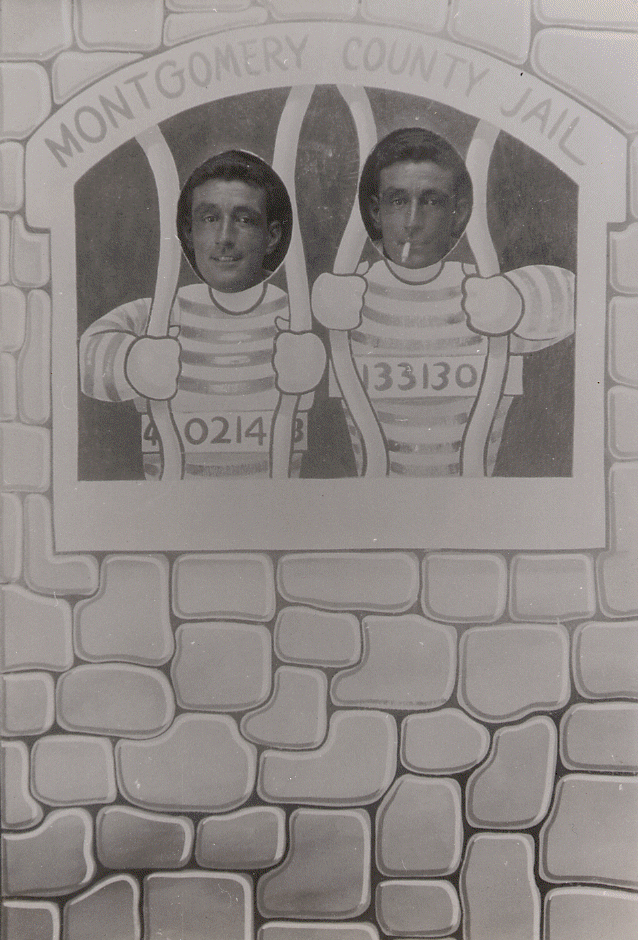
Mock Scene of the jail, a photo set at the park
The Town of Glen Echo, Maryland
By 1904 residents had decided it was time to incorporate and the town of Glen Echo was chartered. Within a few years the town and the amusement park were locking horns, despite the fact that many town residents gained their livelyhood from the amusement park. Conflicts arose over water rights due to several years of severe droughts, and over Sunday activities at the park. The town filed complaints with the county about the park being open and offering amusements on Sunday in violation of local blue-laws. On one Sunday 110 people were arrested at the park including over 70 town residents. The conflicts escalated until 1911 when the mayor of Glen Echo and several town councilmen got into a fistfight at which a gun was pulled over water use at the park. Ultimately the mayor resigned and moved to the nearby town of Kensington.
Between 1900 and 1907 Clara Barton and her assistant Dr. Julian Hubble, purchased dozens of town lots from the Baltzleys, often staving off bankrupcy for the brothers. In 1903 the Baltzleys lost control of the amusement park property which was bought by the Washington Railway & Electric Company who had been managing the amusement park for several years by then. Trying to remain solvent in their other companies, the brothers continued to sell town lots, primarily to Barton and Hubble. Hubble inherited Barton's lots after her death in December of 1912, at that point he owned close to half of the town.
Further Information
In 2007, the town of Glen Echo published a book of the town's history. The book is available on the town's website.




